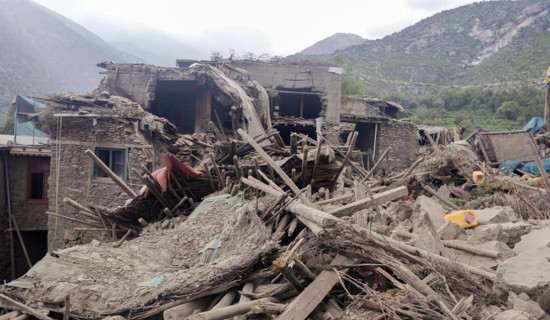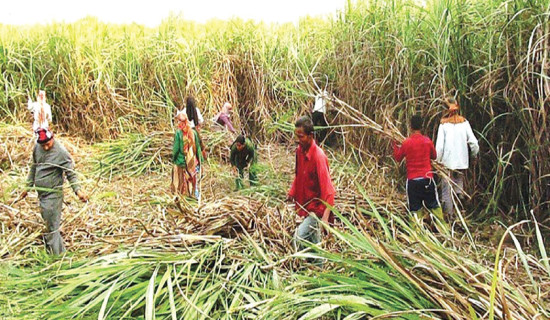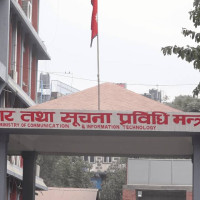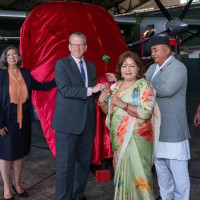- Thursday, 4 September 2025
All Eyes On Rupandehi-3 By-polls
All eyes are transfixed on the parliamentary by-elections to be held for Rupandehi constituency-3 during the upcoming month. This bye-election pits major political parties into competition and ushers them to ascertain their popularity among the voter populace. This upcoming election is considered a political preview and rehearsal of the periodic general elections to be held after two years, which is expected to be a crucial fight between what is said as new and old political forces in the country.
Political commentators label Nepali Congress (NC), Unified Marxist-Leninist (UML) and Maoists as the old and conventional ones in the prevailing context of Nepal who have held power and ruled the country for considerable length of time, whereas Rastriya Swantantra Party (RSP) and the groups like Naya Shakti, Sajha Bibeksheel and Balen shah supported political network, among others, are categorised as new political forces determined to fight the so-called old political forces. Needless to say, Nepal’s political parties are led by septuagenarian leaders who have been holding on to the leadership position invariably for the last several decades.
Ageing party leadership
However, ageing party leadership is gradually facing the challenges of retaining its relevance, acceptability and legitimacy. The challenges to the senior generation of leadership have become more articulate and vociferous after the elections held two and a half years ago. Even within communist parties like the CPN (Maoist Centre) and CPN (UML), internal dissent is brewing to offer a challenge to the central party leadership. Former President of Nepal Bidya Bhandari has decided to enter active politics, whereas senior deputy Janardan Sharma is reportedly asking the Maoist party supremo Prachanda to step down.
The people's frustration and discontent with the political parties and their leadership have been expressed through different media. This had found a clear expression as the independent candidates triumphed in the poll, especially in the mayoral positions in different cities in the country in the previous election. According to a report, over thirty-five independent candidates won the top executive posts for the rural municipalities and municipalities. The emergence of young leadership at local government can be construed, among others, as an indicator of growing aversion to and disenchantment of the voters, especially in the urban areas, with the conventional modus operandi of politics executed by ageing political leaders in the country.
The success of independent candidates in the polls worked as a catalyst and thus motivated and inspired the new generation of youths to join electoral politics to challenge the established order of the ageing party leadership. This surge of new politics won the appreciation and support of the people, because of which the party was able to muster 21 seats in the federal parliament, which was an incredible political feat of its own kind. It was a quiet political transformation executed through ballots in which young political aspirants made their way to the apex seats of parliament. The young political aspirants used their agency to defy the conventional order of party leadership and established a new benchmark.
Like the RSP, experimentation with new political groups had been tried out around a decade ago. Dr. Babu Ram Bhattarai, who had masterminded the ten-year-long Maoist insurgency and headed the country's executive government for almost one and a half years, had started a campaign towards building a renovated variant of alternative politics immediately after the promulgation of the new federal constitution in 2015. Dr. Bhattarai had branded his party as Naya Shakti Party, targeting to dislodge the existing conventional political forces, articulating the narrative that the country needs a new party to give leadership in the changed epoch of the twenty-first century.
Dr. Bhattarai had plunged into the theatrics of the so-called alternative politics as the gallant critic of the Maoist party that he had led and nurtured, contending that the Maoist agenda no longer makes sense and logic in the changed political epoch. Dr. Bhattarai started Naya Shakti Party as an alternative political platform, weaving narratives to challenge the corrupt political practices and values through progressive and transformative praxis.
Poll outcome
He had boiled down his ideas into five key political formulaic aphorisms, which include prosperity, inclusion, good governance, participation and federalism. However, despite his propensity to write novel narratives and commitment to these much-avowed ideas, he could not take the notion of new politics further. However, Dr.Bhattarai is leading the new political outfit called Nepal Samajbadi Party (Naya Shakti) with a commitment to foster alternative politics, though the organisational base of the party he is leading seems to be lean.
Coming to the context of Rupandehi by-elections as mentioned above, the new political forces of different variants can make an effective difference in the poll outcome only if they come together to put up a single candidate on their behalf to fight the stronger parties like the Nepali Congress, CPN(UML), RPP and so on. Otherwise, it will be difficult for them to weaken the political fortress of the parties well entrenched in the area for long.
(The author is presently associated with Policy Research Institute (PRI) as a senior research fellow. )









-original-thumb.jpg)







